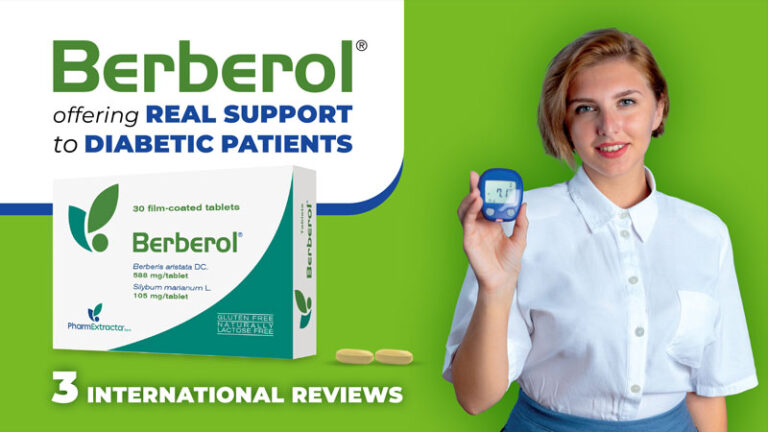
Berberol®: New Review Confirms Its Potential for Managing Glycemic Control and Insulin Resistance
Berberol®, a nutraceutical combining Berberis aristata and Silybum marianum, has shown promise in improving glycemic control and reducing insulin resistance.
A recent meta-analysis highlights its effectiveness in lowering blood glucose and HbA1c levels, thanks to the synergistic action between berberine and silymarin. Berberol® is effective both as a standalone and adjunctive therapy, offering a valuable option for managing glycemic issues.
Berberol®: A Promising Nutraceutical for Managing Glycemic Control and Insulin Resistance
In recent years, the nutraceutical market has seen a significant surge in the development and use of botanical-based supplements aimed at managing chronic metabolic conditions such as diabetes. Among these, Berberol®, a patented fixed-dose combination of Berberis aristata (berberine) and Silybum marianum (silymarin), has gained substantial attention for its potential in improving glycemic control and reducing insulin resistance.
A recent systematic review and meta-analysis published in the Future Journal of Pharmaceutical Sciences (the 3rd international review analyzing the trials available on Berberol®) sheds new light on the efficacy of this combination, affirming its role as a valuable tool in the management of diabetes, whether used as a standalone treatment or in conjunction with other therapies.
Understanding the Berberine-Silymarin Synergy
Berberine, an alkaloid extracted from the roots and bark of Berberis aristata, has long been recognized for its ability to regulate blood glucose levels. However, its poor bioavailability—largely due to its hydrophilic nature—has been a significant hurdle, limiting its therapeutic potential. This is where the synergy with silymarin, derived from Silybum marianum (milk thistle), becomes crucial. Silymarin not only enhances the bioavailability of berberine by inhibiting the P-glycoprotein-mediated efflux but also contributes its own set of beneficial properties, including antioxidant and anti-inflammatory effects that further support metabolic health.0,69
Recent Meta-Analysis Highlights Berberol®’s Efficacy
The recent meta-analysis conducted by Dubey et al. (2024) evaluated the efficacy of the Berberis aristata and Silybum marianum fixed-dose combination on glycemic and insulin resistance parameters. This study is particularly noteworthy, as it is one of the first to systematically analyze the impact of this combination across multiple randomized controlled trials (RCTs), involving a total of 825 participants. Importantly, Berberol® was tested both as a single therapy and in combination with other treatments, and the results consistently demonstrated significant benefits across both approaches.
The findings are promising: the combination significantly reduced fasting blood glucose levels, glycated hemoglobin (HbA1c), and insulin resistance, as measured by the Homeostatic Model Assessment of Insulin Resistance (HOMA-IR) score.
Key Findings and Clinical Implications
The analysis revealed a mean reduction of 5.26 mg/dL in fasting blood glucose and a 0.69 points reduction in HbA1c levels among those taking Berberol® compared to the control group. The results of the current study also suggest that Berberol® is effective in improving glycemic indices by reducing insulin resistance.
These encouraging outcomes are specific to this Berberis aristata and Silybum marianum fixed-dose combination and its proposed dual mechanism of action. Berberine directly activates the AMP-activated protein kinase (AMPK) pathway, which plays a crucial role in glucose uptake and lipid metabolism. Simultaneously, silymarin’s antioxidative properties help mitigate oxidative stress, a common complication in diabetic patients, thereby protecting pancreatic β-cells and improving insulin sensitivity.
Conclusion: A Viable Option for Patients Struggling with Diabetes and Beyond
In conclusion, Berberol® emerges as a potent nutraceutical that offers a natural, effective means of improving glycemic control and reducing insulin resistance. Its unique formulation, which overcomes the bioavailability challenges associated with berberine, makes it a valuable option, especially as an adjunct in the comprehensive management of diabetes. However, the meta-analysis affirms that whether used alone or alongside other therapies, Berberol® shows significant promise in keeping blood glucose under control.
Berberol® was named a finalist for the CPHI Pharma Awards 2020 in the “Finished Formulation” category, and its versatility is supported by several studies demonstrating its effectiveness not only for diabetic patients but also for those with dyslipidemia and metabolic syndrome.
